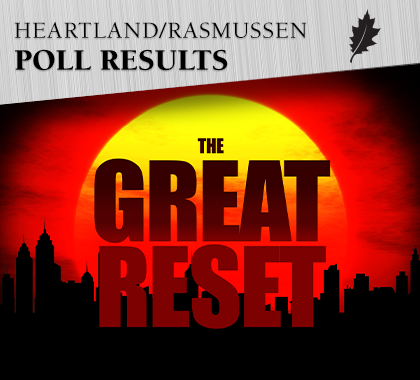ARLINGTON HEIGHTS, IL (December 16, 2020) – A new poll by The Heartland Institute and Rasmussen Reports finds that most voters have an unfavorable view of the “Great Reset” agenda supported by Joe Biden, the World Economic Forum, and other international political and business leaders.
Among those surveyed on December 6-7 who said they have heard of the Great Reset, a majority (53%) said they “somewhat oppose” (10%) or “strongly oppose” (43%) the movement, with the most common reply among all options being “strongly oppose.”
When asked, “How influential should international institutions like the United Nations, World Economic Forum, and International Monetary Fund be in creating regulations governing United States businesses?,” only 9% of respondents answered “very influential,” and 21% answered “somewhat influential.” Conversely, 22% said “not very influential,” and 37% answered “not influential at all.”
The results of this survey clearly show most American voters do not believe international organizations should have a significant amount of influence in America’s economic affairs. The results also demonstrate that most Americans stand in opposition to calls for increased globalism, such as the World Economic Forum’s Great Reset movement, which has already been backed by the incoming Biden administration.
Further, just 3% of likely voters said they believe that “using business resources to pursue social justice causes” should be the main priority of American businesses, which is a primary element of the Great Reset agenda. On the other hand, 44% of likely voters said U.S. businesses should focus on “providing individual consumers with high quality products and services at the lowest prices.”
See the full results of the poll below, including some of the key data from the crosstabs.
The following quotes can be used for attribution. If you’d like to interview a Heartland Institute expert on the Great Reset, including Editorial Director Justin Haskins, one of America’s leading voices opposing the Great Reset, please contact Justin at [email protected] or Director of Communications Jim Lakely at [email protected], or call/text Jim’s cell at 312-731-9364.
“The results from the survey we conducted with Rasmussen Reports are clear: American voters do not support the Great Reset’s radical, anti-capitalism agenda, and they most certainly don’t want international institutions influencing U.S. policy.
“President-elect Joe Biden and his choice for ‘climate czar,’ John Kerry, have already embraced the Great Reset agenda, in complete contradiction to the desires of the American people. If they follow through with their plan to push the United States toward the Great Reset, they will almost certainly pay for it during the 2022 mid-term elections.”
Justin Haskins
Editorial Director and Research Fellow, The Heartland Institute
Co-Lead, Stopping Socialism Project
[email protected]
312/377-4000
“As the Rasmussen/Heartland poll shows, a majority of likely American voters reject the left’s calls for increased globalism. Americans understand that national sovereignty is superior to global governance. Further, according to the data, Americans are weary, as they should be, about the World Economic Forum’s anti-capitalist Great Reset movement. Apparently, Americans are well-aware that globalism is not the answer to U.S. policy issues.”
Chris Talgo
Editor and Research Fellow
The Heartland Institute
[email protected]
312/377-4000
National Survey of 1,000 Likely Voters
Conducted December 6-7, 2020
By The Heartland Institute and Rasmussen Reports
1. Are you familiar with the Great Reset movement, a global economic strategy in response to the pandemic that seeks to change the priorities of capitalism?
35% Yes
41% No
24% Not sure
Interesting Crosstabs:
- 52% of government workers said they are familiar with the Reset, the highest of any employment demographic. (70% of government workers who had heard of the Great Reset said they support it, by far the highest level of support for the Reset. The next closest was people who work for a “private company,” with 43% support.)
- The ideological group most likely to be familiar with the Great Reset was conservatives (44%), followed by moderates (31%) and liberals (23%)
2. (Answered by 350 Likely Voters who have heard of the Great Reset movement) Do you strongly favor, somewhat favor, somewhat oppose or strongly oppose the Great Reset movement?
22% Strongly favor
20% Somewhat favor
10% Somewhat oppose
43% Strongly oppose
4% Not sure
Interesting Crosstabs:
- 76% of Republicans say they do NOT favor the Great Reset. About 3% weren’t sure.
- 72% of Democrats said they favor it.
- 67% of “other” party affiliations say they do NOT favor the Great Reset.
3. Do you have a very favorable, somewhat favorable, somewhat unfavorable or very unfavorable impression of the United Nations?
21% Very favorable
34% Somewhat favorable
19% Somewhat unfavorable
17% Very unfavorable
9% Not sure
Interesting Crosstabs:
- 66% of government workers said they have a “very favorable” or “somewhat favorable” impression, the highest of any employment demographic tested.
- 77% of respondents who said socialism is better than a “free-market economic system” also had a “very favorable” or “somewhat favorable” impression of the U.N.
4. How influential should international institutions like the United Nations, World Economic Forum, and International Monetary Fund be in reducing economic inequality in the United States?
13% Very influential
31% Somewhat influential
18% Not very influential
25% Not at all influential
14% Not sure
Interesting Crosstabs:
- 65% of government workers said “very influential” or “somewhat influential,” the highest of any employment demographic tested.
5. How influential should international institutions like the United Nations, World Economic Forum, and International Monetary Fund be in crafting United States policies meant to address climate change?
19% Very influential
30% Somewhat influential
15% Not very influential
28% Not at all influential
8% Not sure
Interesting Crosstabs:
- ***Important Note: In a separate survey conducted with the same group at the same time as this one, less than 39 percent of all respondents said they believe BOTH that climate change is primarily caused by humans and “federal or state governments [should] require people to engage in activities that will lower carbon-dioxide emissions.” (This strongly indicates that “influential” here for many people does not include regulations.)
- 66% of government workers said “very influential” or “somewhat influential,” the highest of any employment demographic tested.
6. How influential should international institutions like the United Nations, World Economic Forum, and International Monetary Fund be in creating regulations governing United States businesses?
9% Very influential
21% Somewhat influential
22% Not very influential
37% Not at all influential
11% Not sure
Interesting Crosstabs:
- Not a crosstab, but note that only about 30% of all respondents said “very influential” or “somewhat influential,” showing the vast majority of Americans do not want international institutions involved in U.S. affairs. (58% said they don’t think they should be influential.)
- 57% of government workers said “very influential” or “somewhat influential,” the highest of any employment demographic tested by far. (Next closes was “private company” employee, at 37%.)
7. What should be the highest priority for businesses in the United States….earning a profit to benefit shareholders or owners, providing individual consumers with high quality products and services at the lowest prices, providing good benefits and pay to employees, climate change or using business resources to pursue social justice causes?
13% Earning a profit to benefit shareholders or owners
44% Providing individual consumers with high quality products and services at the lowest prices
27% Providing good benefits and pay to employees
6% Climate change
3% Using business resources to pursue social justice causes
7% Not sure
Interesting Crosstabs:
- Only 8% of Democrats said “climate change.” Just 4% of Democrats said “social justice causes.”
NOTE: Margin of Sampling Error, +/- 3 percentage points with a 95% level of confidence.
The Heartland Institute is a 36-year-old national nonprofit organization headquartered in Arlington Heights, Illinois. Its mission is to discover, develop, and promote free-market solutions to social and economic problems. For more information, visit our website or call 312/377-4000.






